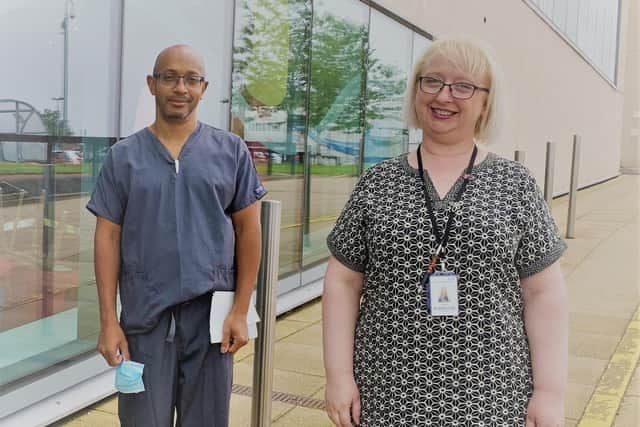'My pain after eating turned out to be pancreatic cancer'
and live on Freeview channel 276
Alice Walmsley, who lives in Preston, had visited her local GP complaining of abdominal pain after eating, but was initially diagnosed with indigestion problems. After the symptoms continued, she was sent for a CT scan at Royal Preston Hospital.
As a result, she was then urgently referred via the Rapid Diagnostic Service to East Lancashire Hospitals NHS Trust. Within days she was diagnosed with pancreatic cancer and underwent a nine-hour operation to remove the tumour.
Advertisement
Hide AdAdvertisement
Hide AdPancreatic cancer is seldom detected at its early stages, because it often doesn’t cause symptoms until it has progressed.


Mrs Walmsley is now recovering at home following the successful operation. She said: “I cannot speak highly enough of the care and attention by the doctors who conducted the Whipple operation, and also to all the nurses attending to me with great care and attention now I am home.
“I want to encourage everyone to understand the signs and symptoms of pancreatic cancer, as it could help save their life.”
The Rapid Diagnostic Service helps patients who present with vague but worrying symptoms by fast-tracking them to get a diagnosis.
Advertisement
Hide AdAdvertisement
Hide AdAccording to hospital bosses, the collaborative work between the teams at Lancashire Teaching Hospitals NHS Foundation Trust and East Lancashire Hospitals Trust is key to the success of the Rapid Diagnostic Service, which aims to improve and enhance patient experience and outcomes.
This is part of a Lancashire and South Cumbria wide initiative designed to support earlier diagnosis, with improved patient experience, for all patients with symptoms that could indicate cancer. NHS hospitals across the area are working together with Primary Care and other partners to strengthen cancer diagnostic services in order to confirm or exclude a cancer diagnosis sooner.
They say this will improve outcomes for local people diagnosed with cancer.
November is Pancreatic Cancer Awareness Month, and the Rapid Diagnostic team want to encourage the public to ‘Think Pancreatic Cancer’.
Advertisement
Hide AdAdvertisement
Hide AdAs Mrs Walmsley only presented with one of the symptoms of pancreatic cancer, and didn’t experience any weight loss, it made it more difficult to diagnose. One in four patients who are diagnosed with pancreatic cancer sadly die within 28 days of receiving their diagnosis, so doctors at the hospital are very keen to highlight the importance of knowing the signs and symptoms.
The most common symptoms are jaundice: the whites of your eyes or skin could turn yellow, you may also have itchy skin, darker pee or paler poo than usual; loss of appetite or losing weight without trying to do; back pain; nausea or vomiting or a persistent change in bowel habits. If you have any of these symptoms, it is important to contact your GP to be checked out.
Vicki Stevenson-Hornby, specialist Pancreatic Nurse at East Lancashire Hospitals NHS Trust, said:
“Pancreatic cancer does not have a screening programme, affects males and females in equal numbers and has seen very little improvement in survival rates in almost 50 years. But by raising awareness of the disease and of the symptoms, there is greater possibility of more patients receiving an earlier diagnosis and of being offered potentially lifesaving surgery.”
Advertisement
Hide AdAdvertisement
Hide AdVicki Stevenson-Hornby, specialist Pancreatic Nurse at East Lancashire Hospitals NHS Trust, said:
“Pancreatic cancer does not have a screening programme, affects males and females in equal numbers and has seen very little improvement in survival rates in almost 50 years. But by raising awareness of the disease and of the symptoms, there is greater possibility of more patients receiving an earlier diagnosis and of being offered potentially lifesaving surgery.”
It is more important than ever on you taking out a digital subscription to support our journalism.
For unlimited access to news and information online, see https://www.lep.co.uk/subscriptions
Comment Guidelines
National World encourages reader discussion on our stories. User feedback, insights and back-and-forth exchanges add a rich layer of context to reporting. Please review our Community Guidelines before commenting.
